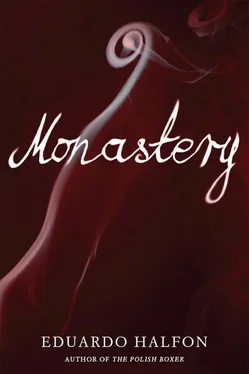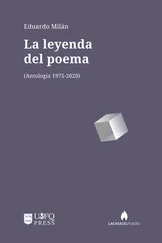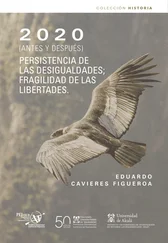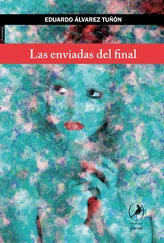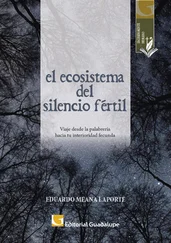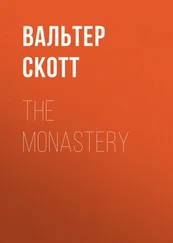I sat down between two old Poles, without taking off my pink coat. I thought they both looked a bit like my grandfather. I tried not to see them as traitors, not to judge them, not to condemn all old Poles. I made a futile attempt to forget my grandfather’s words. And warming up as I ate dish after dish (the best one: that dessert, which turned out to be a Polish version of crepes or blintzes), I finally realized that my entire dinner had cost a little less than two dollars. The great mathematics of socialism.
BOB DYLAN’S VOICE WHINED in the background. Tamara was singing. Yael had filled my glass again and was now flirting with a guy who looked Scottish and who quite likely was the owner of the bar. I kept looking at Yael. She had a silver belly-button ring. I pictured her in military uniform, toting a huge machine gun. I turned and looked back, and Tamara was smiling at me as she sang. Her, I could only picture naked.
I took a long swallow and emptied my glass. An old indigenous man had walked into the bar and was trying to sell machetes and huipiles. I told Tamara that I was running late but that we could meet the following day. Can you come back here from the capital? she asked. Sure, I’d love to, it’s only thirty minutes by car (I’d parked the Saab out on the street). All right, she said, I get out of class at six. Should we meet here? Ken, I said, which means yes in Hebrew, and I gave her a half smile. I love your mouth, it’s shaped like a heart, she said, and then she stroked my lips with her finger. I said thank you, and told her that I really liked my lips stroked with a finger. I do too, Tamara whispered in her bad Spanish, and then, still in Spanish and baring all her teeth like a hungry lioness, she added: But what I like even more is having my nipples bitten, and hard. I wasn’t sure if she really understood what she was saying or if she’d said it as a joke. She leaned into me and made me shiver with a kiss on my neck. I wondered what her nipples looked like, if they were round or pointy, pink or vermilion or maybe translucent violet, and standing up to leave, I said in Spanish that it was a shame, because when I bite them, I bite them soft.
I paid for all the beers and we agreed to meet right there, at six o’clock. I gave her a tight hug, feeling something that has no name but is as loud and clear as the white smoke from the Vatican on a dark winter night, and knowing full well that I wouldn’t be back the next day.
It was raining in Harlem.I was standing on the corner of 162nd and Amsterdam, my coat already damp, my old umbrella barely holding out against the sudden gusts of wind. It was almost four in the afternoon, and already starting to get dark. I didn’t know Harlem. I didn’t know which way to walk. I didn’t know which direction would take me to Edgecombe Avenue, in Washington Heights. I just stood there looking up the street as if I might be able to recognize something in the rain and the wind and the premature December dusk. I hunched under the umbrella. With some difficulty, I managed to light a limp, rain-specked cigarette.
Heading to Marjorie’s, I presume.
Her presence beside me, all stoic, gave me a start. She seemed not to mind the rain. Or not to know it was raining.
You’re heading to Marjorie’s, I presume, she said again, taking a pair of thin black woolen gloves out of her bag. But you don’t know how to get there, she added, and took a long black woolen scarf out of her bag. I could tell by looking at you.
Her English sounded faintly accented. Caribbean, perhaps. African, perhaps. The skin on her face was deep black and flawless and probably still silky smooth. The whites of her eyes shone in the gloom. Only the slight gray in her hair — a short Afro — gave away her age.
Is it that obvious? I asked, and she did up the buttons on her black raincoat and folded her arms and said she could tell by the day, by the time, by the subway station on the corner of 162nd and Amsterdam, by the expression on my face, by the fact that there was always one to be found standing there, on that corner. She took out of her bag a black felt cloche hat, bell-shaped, 1920s style. You always find someone looking lost in the middle of Harlem? I asked her. Or you always find someone with an expression on his face that says he’s desperately searching for the way to Marjorie’s? And I smiled with a mixture of shame and solace. Something like that, she said. Come on. It’s this way, child. She had already started to walk. I hurried and took a final drag on my cigarette and, crushing it out on the ground, discovered with pleasant surprise that under the thick folds of her black raincoat, splashing indifferently through the puddles, was a pair of bloodred cowboy boots.

SO IT’S YOUR FIRST TIME, THEN?
I was surprised at how slowly and gracefully she walked. As if following a rhythm. As if she were a model on a catwalk: elegant, exotic, aware of being watched. As if she were in no hurry to arrive and get out of the rain. Several times I offered her my umbrella — flimsy and fragile in the wind — but she didn’t notice, or didn’t care, or didn’t want to get too close to a stranger. Rain was dripping from the brim of her cloche hat. I was still entranced by her bloodred boots. Perhaps because of the bloodred color. Perhaps because I’d never myself owned cowboy boots. Too spineless.
Yes, my first time, I said. A friend sent me a postcard, I told her, with a photo of Marjorie in a long turquoise dress, or maybe a mint green dress, I said, and ebony hands, and the address of the apartment on Edgecombe Avenue, I said, but without telling me much more. I considered getting out the postcard and showing it to her, as evidence. You don’t know who Marjorie is, then? she asked. I said sort of, said that I knew a bit. We stopped on the corner of 161st and Amsterdam. Look, they’re heading over there, she said, pointing at a couple holding a folded map. And them too, pointing at another group of pedestrians. And him, she said, pointing at an older gentleman in jacket and tie and carrying a big black case. How do you know? I asked. She smiled or almost smiled in the darkness. Many a Sunday, child.
The light changed and we began to cross the street.
Marjorie Eliot, that’s her name, she said. For years she’s been opening her apartment on Sundays, every Sunday, without taking a break or a vacation, ever since one Sunday back in 1992, when her son died. She fell silent. A sharp gust of wind struck us head-on. Every Sunday a jazz concert, she continued. Parlor jazz. At four in the afternoon. In the living room of her own apartment. With different musicians. The musicians come and go. Novice musicians and famous musicians and musician friends of hers. And it’s always free. She always welcomes anyone who wants to come to her home and listen to a couple of hours of jazz, and that’s a lot of people. She paused, took a deep breath, and with a soothing, almost secretive voice, she whispered: And all that to honor the memory of her son, through music.
We turned left. She asked me my name. Very pleased to meet you, Eduardo, she said. My name’s Shasta. There are some names that shimmer, it occurred to me then, or perhaps it occurs to me now. There are names you long to shout. She asked me where I was from and I told her Guatemala, that I was only in New York for a few days, just passing through. I considered telling her I was there, passing through, to receive some Guggenheim money — God love it, wrote Vonnegut, or Vonnegut’s narrator — that soon, if I ever got over my fears and demons, I would use to travel to Poland, to Łódź, my grandfather’s hometown. But I didn’t say any more. And she didn’t ask any more, accustomed, I’m sure, like all New Yorkers, to the fact that everybody there is just passing through, that everybody there is on their own ridiculous pilgrimage, that the whole world is nothing but a handful of salt.
Читать дальше
